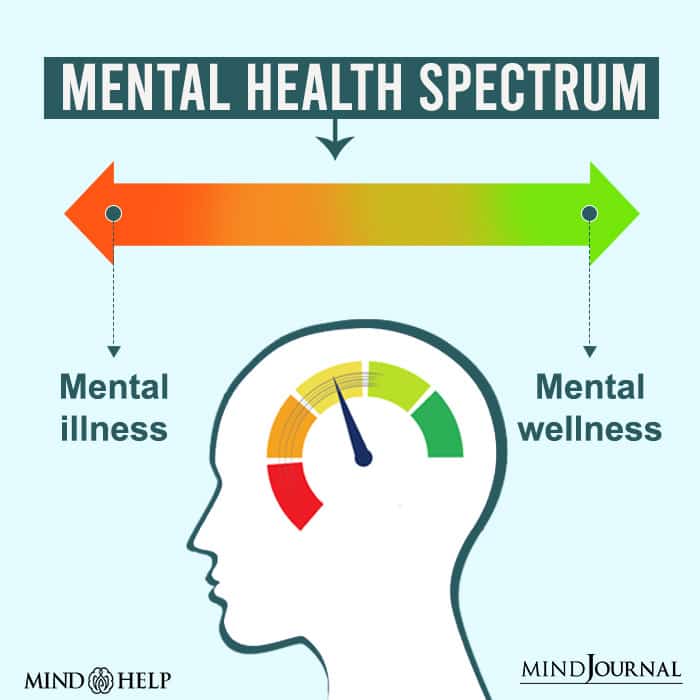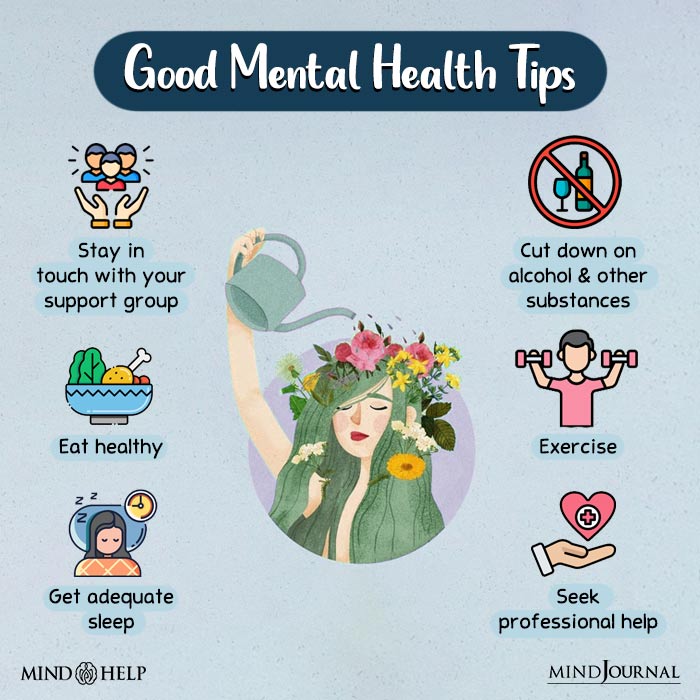Good mental health refers to a state of well-being where an individual experiences happiness, health, and effective functioning in daily life. While the absence of mental disorders is one aspect of this state, it is not the only one.
What Is Good Mental Health?
Good mental health is a state of well-being that enables us to cope with daily stressors [mfn] Fusar-Poli, P., Salazar de Pablo, G., De Micheli, A., Nieman, D. H., Correll, C. U., Kessing, L. V., Pfennig, A., Bechdolf, A., Borgwardt, S., Arango, C., & van Amelsvoort, T. (2020). What is good mental health? A scoping review. European neuropsychopharmacology : the journal of the European College of Neuropsychopharmacology, 31, 33–46. https://doi.org/10.1016/j.euroneuro.2019.12.105 [/mfn], perform tasks effectively, realize our professional and personal goals, and contribute to society.
According to the World Health Organization (WHO [mfn] World Health Organization. (2022, June 17). Mental health: Strengthening Our Response. Available from: https://www.who.int/news-room/fact-sheets/detail/mental-health-strengthening-our-response [/mfn]), good mental health is not just the absence of mental disorders but much more than that. In fact, mental well-being lies on a complicated spectrum and strongly influences our thoughts, emotions, and behavior.

Closely related to the concept of positive or good mental health is psychological well-being [mfn] Trudel-Fitzgerald, C., Millstein, R. A., von Hippel, C., Howe, C. J., Tomasso, L. P., Wagner, G. R., & VanderWeele, T. J. (2019). Psychological well-being as part of the public health debate? Insight into dimensions, interventions, and policy. BMC public health, 19(1), 1712. https://doi.org/10.1186/s12889-019-8029-x [/mfn] (PWB) which includes several dimensions, such as self-acceptance, personal growth, mastery, life purpose, autonomy, positive affect, optimism, sense of coherence, and life satisfaction.
Signs Of Good Mental Health
There are certain cardinal characteristics of good mental health, such as your ability to
- Experience, express, and regulate a range of emotions
- Recover from hardships
- Deal with uncertainty & change
- Gain and apply knowledge
- Work, reach goals, and realize your potential
- Build and maintain meaningful relationships
- Be aware of your emotions and mood fluctuations
- Set healthy personal boundaries
- Practice self-care and self-love
- Ability to contribute to the community and experience a sense of belonging
While these are examples of good mental health, it is not necessary that you feel good and happy all the time [mfn] Huppert, F. A. (2009). Psychological Well-being: Evidence Regarding its Causes and Consequences. Applied Psychology: Health and Well-Being, 1(2), 137–164. https://doi.org/10.1111/j.1758-0854.2009.01008.x [/mfn]. Difficult feelings, like failure, sadness, anger, grief, or disappointment, are also necessary and we must learn how to manage them.
Benefits Of Good Mental Health
The importance of good mental health has been reiterated by experts time and again. Some advantages of having good mental health are:
- Healthier and long-lasting interpersonal relationships
- Better academic and professional success
- A sense of purpose in life
- High self-worth and self-confidence
- Being able to have fun and feeling happy
- A sense of satisfaction and mental peace
How To Have Good Mental Health
It is quite natural for our mental health to vary from good to poor depending on life situations and hormone imbalances. So it is crucial for us to consciously try and maintain good mental health.
Some ways to have good mental health are discussed below.
1. Socialize and Connect with People
Humans are essentially social animals. Numerous studies [mfn] Umberson, D., & Montez, J. K. (2010). Social relationships and health: a flashpoint for health policy. Journal of health and social behavior, 51 Suppl(Suppl), S54–S66. https://doi.org/10.1177/0022146510383501 [/mfn] have attested to the fact that isolation can be bad for mental health. Some ways you can stay connected with people are by
- Planning meetups and video calls
- Using social media from time to time
- Joining clubs and taking part in activities
- Calling/ texting your friends to stay in touch with them
2. Exercise
Exercise boosts physical health and enhances self-esteem while reducing negative emotions [mfn] Sharma, A., Madaan, V., & Petty, F. D. (2006). Exercise for mental health. Primary care companion to the Journal of clinical psychiatry, 8(2), 106. https://doi.org/10.4088/pcc.v08n0208a [/mfn]. It is often a supplement to treating mental health conditions such as anxiety disorders and depression.
Here are some :
- Take a walk during your lunch break
- Use the stairs instead of the elevator
- Join a fitness class or sports team
- Bike or walk instead of driving for short trips
- Do bodyweight exercises during commercial breaks while watching TV
- Take a walk or do some stretching after meals
- Play with your kids or pets outside
- Use a standing desk or take standing breaks throughout the day
3. Practice Being Mindful
One of the best ways to develop good mental health is to pay attention to and live in the present moment. By being more mindful [mfn] Groves P. (2016). Mindfulness in psychiatry – where are we now?. BJPsych bulletin, 40(6), 289–292. https://doi.org/10.1192/pb.bp.115.052993 [/mfn] and aware of our thoughts, emotions, and physical sensations, we can be better in touch with ourselves and our environment.
It can help to lift our mood and empower us to experience more positive thoughts and feelings. Mindfulness has been proven to increase subjective well-being, reduce emotional reactivity, and improve behavioral regulation [mfn] Keng, S. L., Smoski, M. J., & Robins, C. J. (2011). Effects of mindfulness on psychological health: a review of empirical studies. Clinical psychology review, 31(6), 1041–1056. https://doi.org/10.1016/j.cpr.2011.04.006 [/mfn].
Read More About Mindfulness Here
4. Follow a Healthy Lifestyle
Good mental health is closely related to our lifestyle [mfn] Rohrer, J. E., Pierce, J. R., Jr, & Blackburn, C. (2005). Lifestyle and mental health. Preventive medicine, 40(4), 438–443. https://doi.org/10.1016/j.ypmed.2004.07.003 [/mfn]. According to a 2019 study [mfn] Zaman, R., Hankir, A., & Jemni, M. (2019). Lifestyle Factors and Mental Health. Psychiatria Danubina, 31(Suppl 3), 217–220. [/mfn], certain lifestyle factors play a crucial role in preventing mental disorders. Some of these include:
- Getting adequate sleep
- Eating healthy, nutritious food
- Avoiding alcohol and other substances
- Reducing consumption of excessive trans fats, refined carbs, sugar and caffeine
- Living in a safe environment
- Regularly checking up with a doctor
5. Seek Help
While ups and downs are a part of life, they can still overwhelm us and make it difficult for us to function in our lives. In such situations, it might be best to speak to a counselor or a therapist, or even join a support group of people who might be suffering from a similar issue.

What Is Poor Mental Health?
So far, we talked about what mental wellbeing means and how we can better take care of it. However, despite everything, it is not possible for our mental health to be at its best at all times. Poor mental health can result from a number of factors, including genetics, upbringing, traumatic life events, and certain lifestyle choices.
Poor mental health leads to impairment in functioning and extreme distress and can give rise to mental disorders. Mental illnesses [mfn] Malla, A., Joober, R., & Garcia, A. (2015). “Mental illness is like any other medical illness”: a critical examination of the statement and its impact on patient care and society. Journal of psychiatry & neuroscience : JPN, 40(3), 147–150. https://doi.org/10.1503/jpn.150099 [/mfn] affect our thoughts, feelings, behaviors, relationships, and our ability to perform daily activities.
Most people, however, may not suffer from any psychological conditions but may struggle with life challenges and experience poor mental health from time to time.
Signs of Poor Mental Health
Here are a few common signs of poor mental health for you to watch out for:
- Feeling anxious, afraid, or worrying excessively [Read more]
- Feeling a sense of hopelessness or helplessness
- Experiencing sudden and extreme shifts in the mood [Read more]
- Feeling upset or sad for a long time [Read more]
- Feelings of emptiness or a lack of purpose
- Having constant intrusive thoughts [Read more]
- Being unable to cope with daily stress and problems
- Facing difficulties with learning, concentrating, memory, or speech [Read more]
- Having distorted perceptions of reality [Read more] (hallucinations and/or delusions)
- Feeling apathy
- Behaving unusually
- Feeling drained and exhausted
- Experiencing sleep disturbances and changes in appetite
- Feeling angry or irritable constantly
- Facing a lack of interest in things and a low sex drive
- Experiencing trouble relating to or connecting with others
- Dissociation or disconnection from yourself or with the world around you [Read more]
- Losing/ gaining a lot of weight
- Unexplained pains, aches, and other physical ailments [Read more]
- Isolating from everyone
- Substance abuse [Read more]
- Frequent thoughts of self-harm [Read more]
If you are unable to cope with life stressors or believe that you’re experiencing some symptoms of mental illness, seek professional help immediately. Treatment, coping strategies, and support can significantly help to improve our mental health and well-being.
Takeaway
Mental health exists on a spectrum, with mental illnesses at one end and good mental health at the other. However, good mental health is not a fixed state and can change based on various factors. Practicing good mental hygiene can help regulate thoughts and feelings, prevent mental illnesses, and improve overall well-being for a happier and more fulfilling life.
At A Glance
- Good mental health enables us to handle daily stressors, function efficiently, prevent mental illnesses, and promote social development.
- Psychological well-being is not limited to the absence of diagnosable mental illnesses.
- Good mental health includes happiness, resilience, confidence, autonomy, purpose, positive emotions, relationships, and life satisfaction.
- Some good mental health habits are following a healthy lifestyle, being mindful, exercising, and seeking help and support.
- Mental health lies on a spectrum and is not in a permanent, static or fixed state.
- Practicing good mental hygiene can help us maintain good mental health and prevent the onset of mental disorders.
Frequently Asked Questions
1. What is the difference between positive and negative mental health?
Positive mental health includes happiness, positive emotions, and effective functioning in daily life, while negative mental health involves distress, impaired functioning, and reduced quality of life. Positive mental health encompasses more than the absence of mental illness, while negative mental health includes experiencing dysfunction or distress in one or more areas of life.
2. What can poor mental health lead to?
Poor mental health can lead to negative outcomes such as impaired functioning, reduced quality of life, social isolation, and mental health disorders such as depression and anxiety.
3. What is a mentally healthy person?
A mentally healthy person is someone who experiences happiness, purpose, positive emotions, resilience, confidence, autonomy, positive relationships, and effective functioning in daily life.

Leave a Reply